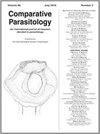Stowaways: Marine Leeches Infecting Olive Ridley Sea Turtles Entangled in Ghost Nets in Maldivian Waters
IF 0.4
4区 医学
Q4 PARASITOLOGY
引用次数: 1
Abstract
ABSTRACT: Sea turtles are known to host a wide variety of organisms, including parasitic marine leeches of the family Ozobranchidae. Leeches are sanguivorous (blood feeders) and are typically found on soft skin areas of turtles, such as the cloaca and corners of eyes and mouth. Superinfection with this parasite can lead to severe damage to the host. Additionally, Ozobranchidae have been shown to be a potential candidate as a mechanical vector for the tumor-inducing fibropapilloma-associated turtle herpesvirus. Marine Ozobranchidae have been found in all major ocean basins infecting all hard-shelled sea turtle species. Records from the Indian ocean are scarce but indicate a widespread distribution. In this study, we present the first cases of ozobranchid leeches found on sea turtles in the Maldives. The host turtles were entangled in abandoned, lost, or discarded fishing nets (also known as ghost nets), and treated at the Olive Ridley Project's Marine Turtle Rescue Centre in Baa Atoll in the Maldives. All hosts were olive ridley turtles (Lepidochelys olivacea), which are typically not resident to the country, but are often observed entangled in ghost nets. The entangled turtles are thought to be carried over great distances when floating in various ocean currents. Ozobranchid leeches were identified to the species level with morphological and barcoding methods and compared to previously published sequences from around the globe. The presence of parasitic leeches on entangled turtles and potential epidemiological implications for the endemic populations of sea turtle species throughout the Indian Ocean are discussed.粪便:马尔代夫水域感染橄榄脊海龟的海蜇被困在鬼网中
摘要:众所周知,海龟是多种生物的宿主,其中包括水蛭科的寄生水蛭。水蛭是嗜血的(吸血动物),通常在乌龟柔软的皮肤上发现,比如泄殖腔、眼角和嘴角。这种寄生虫的重复感染会对宿主造成严重损害。此外,Ozobranchidae已被证明是肿瘤诱导纤维乳头瘤相关龟疱疹病毒的潜在机械载体。在所有主要的海洋盆地中都发现了海洋小分枝科,感染了所有硬壳海龟物种。来自印度洋的记录很少,但表明它们分布广泛。在这项研究中,我们提出了在马尔代夫海龟身上发现的第一例水蛭。宿主海龟被困在被遗弃、丢失或丢弃的渔网(也被称为鬼网)中,并在马尔代夫Baa环礁的Olive Ridley项目海龟救援中心接受治疗。所有的寄主都是橄榄蠵龟(Lepidochelys olivacea),它们通常不是该国的居民,但经常被鬼网缠住。人们认为,这些被缠在一起的海龟在各种洋流中漂浮时,会被带到很远的地方。利用形态学和条形码方法对水蛭进行了物种鉴定,并与之前发表的全球水蛭序列进行了比较。讨论了缠结海龟上寄生水蛭的存在及其对整个印度洋海龟特有种群的潜在流行病学影响。
本文章由计算机程序翻译,如有差异,请以英文原文为准。
求助全文
约1分钟内获得全文
求助全文
来源期刊

Comparative Parasitology
医学-动物学
CiteScore
1.00
自引率
0.00%
发文量
16
审稿时长
>12 weeks
期刊介绍:
Comparative Parasitology (continuing the Journal of the Helminthological Society of Washington in its 67th volume) focuses on parasitological research of a comparative nature, emphasizing taxonomy, systematics, ecology, biogeography, evolution, faunal survey, and biological inventory within a morphological and/or molecular context. The scope of Comparative Parasitology extends to all parasitic faunas, including helminths, protistans and arthropods.
 求助内容:
求助内容: 应助结果提醒方式:
应助结果提醒方式:


